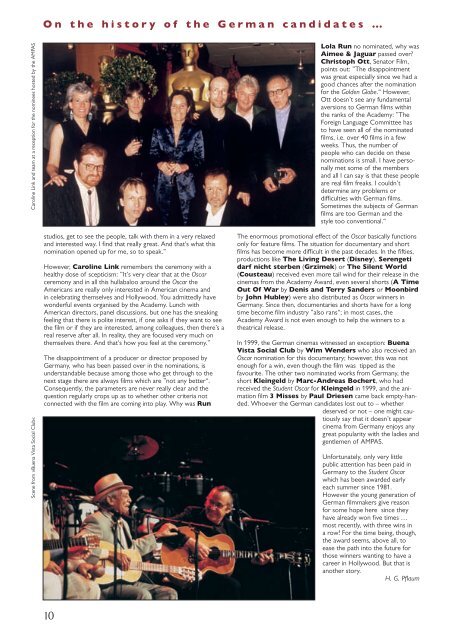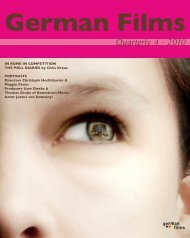Titel Kino 2-2000 - German Films
Titel Kino 2-2000 - German Films
Titel Kino 2-2000 - German Films
You also want an ePaper? Increase the reach of your titles
YUMPU automatically turns print PDFs into web optimized ePapers that Google loves.
Caroline Link and team at a reception for the nominees hosted by the AMPAS<br />
Scene from »Buena Vista Social Club«<br />
On the history of the <strong>German</strong> candidates …<br />
studios, get to see the people, talk with them in a very relaxed<br />
and interested way. I find that really great. And that's what this<br />
nomination opened up for me, so to speak.”<br />
However, Caroline Link remembers the ceremony with a<br />
healthy dose of scepticism: ”It’s very clear that at the Oscar<br />
ceremony and in all this hullabaloo around the Oscar the<br />
Americans are really only interested in American cinema and<br />
in celebrating themselves and Hollywood. You admittedly have<br />
wonderful events organised by the Academy. Lunch with<br />
American directors, panel discussions, but one has the sneaking<br />
feeling that there is polite interest, if one asks if they want to see<br />
the film or if they are interested, among colleagues, then there’s a<br />
real reserve after all. In reality, they are focused very much on<br />
themselves there. And that's how you feel at the ceremony.”<br />
The disappointment of a producer or director proposed by<br />
<strong>German</strong>y, who has been passed over in the nominations, is<br />
understandable because among those who get through to the<br />
next stage there are always films which are ”not any better“.<br />
Consequently, the parameters are never really clear and the<br />
question regularly crops up as to whether other criteria not<br />
connected with the film are coming into play. Why was Run<br />
10<br />
Lola Run no nominated, why was<br />
Aimee & Jaguar passed over?<br />
Christoph Ott, Senator Film,<br />
points out: ”The disappointment<br />
was great especially since we had a<br />
good chances after the nomination<br />
for the Golden Globe.“ However,<br />
Ott doesn’t see any fundamental<br />
aversions to <strong>German</strong> films within<br />
the ranks of the Academy: ”The<br />
Foreign Language Committee has<br />
to have seen all of the nominated<br />
films, i.e. over 40 films in a few<br />
weeks. Thus, the number of<br />
people who can decide on these<br />
nominations is small. I have personally<br />
met some of the members<br />
and all I can say is that these people<br />
are real film freaks. I couldn’t<br />
determine any problems or<br />
difficulties with <strong>German</strong> films.<br />
Sometimes the subjects of <strong>German</strong><br />
films are too <strong>German</strong> and the<br />
style too conventional.“<br />
The enormous promotional effect of the Oscar basically functions<br />
only for feature films. The situation for documentary and short<br />
films has become more difficult in the past decades. In the fifties,<br />
productions like The Living Desert (Disney), Serengeti<br />
darf nicht sterben (Grzimek) or The Silent World<br />
(Cousteau) received even more tail wind for their release in the<br />
cinemas from the Academy Award, even several shorts (A Time<br />
Out Of War by Denis and Terry Sanders or Moonbird<br />
by John Hubley) were also distributed as Oscar winners in<br />
<strong>German</strong>y. Since then, documentaries and shorts have for a long<br />
time become film industry ”also rans“; in most cases, the<br />
Academy Award is not even enough to help the winners to a<br />
theatrical release.<br />
In 1999, the <strong>German</strong> cinemas witnessed an exception: Buena<br />
Vista Social Club by Wim Wenders who also received an<br />
Oscar nomination for this documentary; however, this was not<br />
enough for a win, even though the film was tipped as the<br />
favourite. The other two nominated works from <strong>German</strong>y, the<br />
short Kleingeld by Marc-Andreas Bochert, who had<br />
received the Student Oscar for Kleingeld in 1999, and the animation<br />
film 3 Misses by Paul Driesen came back empty-handed.<br />
Whoever the <strong>German</strong> candidates lost out to – whether<br />
deserved or not – one might cautiously<br />
say that it doesn’t appear<br />
cinema from <strong>German</strong>y enjoys any<br />
great popularity with the ladies and<br />
gentlemen of AMPAS.<br />
Unfortunately, only very little<br />
public attention has been paid in<br />
<strong>German</strong>y to the Student Oscar<br />
which has been awarded early<br />
each summer since 1981.<br />
However the young generation of<br />
<strong>German</strong> filmmakers give reason<br />
for some hope here since they<br />
have already won five times …<br />
most recently, with three wins in<br />
a row! For the time being, though,<br />
the award seems, above all, to<br />
ease the path into the future for<br />
those winners wanting to have a<br />
career in Hollywood. But that is<br />
another story.<br />
H. G. Pflaum










